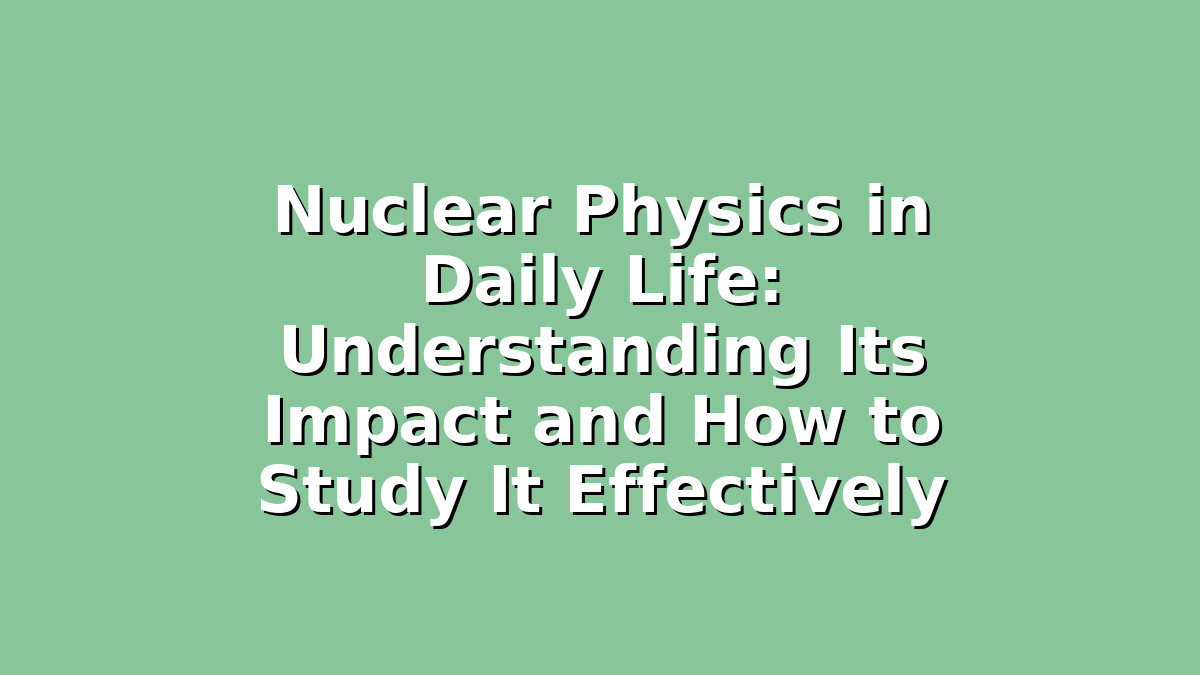Nuclear physics might sound like a complex topic reserved for scientists in labs, but in reality, it plays a crucial role in our everyday lives. As a student preparing for exams, understanding how nuclear physics connects to daily life can make your studies more interesting and relatable. This connection can also help you retain information better and perform well in your exams. In this article, we’ll explore the significance of nuclear physics in daily life and offer practical study tips tailored for students aiming to master this subject confidently.
Introduction: Why Study Nuclear Physics?
Nuclear physics studies the components and behavior of atomic nuclei. While this sounds highly technical, its concepts are fundamental to many technologies and processes you encounter regularly. From the electricity that powers your home to the medical treatments that save lives, nuclear physics is everywhere. Realizing this can boost your motivation and provide context as you prepare for exams. Moreover, grasping the basics of nuclear physics will help you understand related topics in chemistry, biology, and environmental science, making your overall learning experience more cohesive.
1. Nuclear Physics in Daily Life: Practical Examples to Remember
One of the best ways to study nuclear physics is by linking theory to real-world applications. Here are some key examples you should know:
– Electricity Generation: Nuclear power plants use controlled nuclear reactions to produce heat, which then generates electricity. Understanding the process of nuclear fission (splitting atoms) helps you grasp how energy is released on a massive scale efficiently and with low greenhouse gas emissions.
– Medical Applications: Nuclear physics is critical in medical imaging and treatments. Techniques such as X-rays, PET scans, and radiation therapy rely on knowledge about radioactive isotopes and nuclear decay. Recognizing these practical uses can make abstract concepts more tangible and memorable.
– Food Preservation and Safety: Nuclear technology is used to sterilize food and extend shelf life through irradiation, preventing spoilage and foodborne illnesses. This example highlights how nuclear physics contributes to health and safety in everyday contexts.
Study Tip: Create flashcards linking each nuclear physics concept with a daily life example. This technique helps with active recall and makes your revision more engaging.
2. Mastering the Core Concepts: Focused Study Strategies
Nuclear physics involves several core concepts like radioactivity, nuclear reactions, half-life, and nuclear energy. To excel in exams, you need to understand these clearly and practice applying them.
– Break Down Complex Topics: Don’t try to learn everything at once. Divide the syllabus into manageable chunks. For example, focus on the types of radiation first—alpha, beta, and gamma—then move to nuclear reactions and energy calculations.
– Use Visual Aids: Diagrams of atomic nuclei, decay chains, and reaction processes can make comprehension easier. Draw your own charts or use online resources and videos to visualize how particles behave and transform.
– Solve Past Papers: Applying theory to solve previous exam questions builds confidence. You’ll become familiar with the question format and improve your problem-solving speed.
Study Tip: Set up a study schedule dedicating specific time slots to each nuclear physics topic. Regular revision spaced over days or weeks strengthens memory retention and reduces exam stress.
3. Effective Exam Preparation: Tips to Stay Motivated and Confident
Preparing for nuclear physics exams can be challenging, but with the right mindset and strategies, you can succeed.
– Connect Concepts with Daily Life: As you study, keep reminding yourself how nuclear physics affects real-world scenarios. This connection can inspire curiosity and make study sessions feel less like rote memorization.
– Form Study Groups: Discussing nuclear physics topics with peers can deepen understanding. Teaching concepts to others is also a powerful way to reinforce your knowledge.
– Stay Positive and Take Breaks: Mental fatigue can hinder your learning. Take regular breaks during study sessions, practice mindfulness, and reward yourself for milestones reached.
– Use Mnemonics and Analogies: To remember complex terms and processes, create simple mnemonics or analogies. For instance, think of half-life as a “countdown timer” for radioactive decay.
Study Tip: Before exams, try to simulate test conditions by timing yourself while answering questions. This practice builds exam readiness and reduces anxiety.
Conclusion: Embracing Nuclear Physics as a Valuable Study Subject
Nuclear physics is more than just a challenging academic subject—it’s a science that shapes many aspects of our daily lives, from energy production to healthcare. As a student, recognizing these real-life connections can boost your interest and help you grasp difficult concepts more easily. By breaking down topics, linking theory to practical examples, and adopting effective study techniques, you can prepare confidently for your exams. Remember, consistent effort and a curious mindset are your best tools for success in nuclear physics.
Keep exploring, practicing, and connecting ideas. Your hard work will pay off, and you’ll gain not only exam success but a deeper appreciation of how science impacts the world around you.

Responses